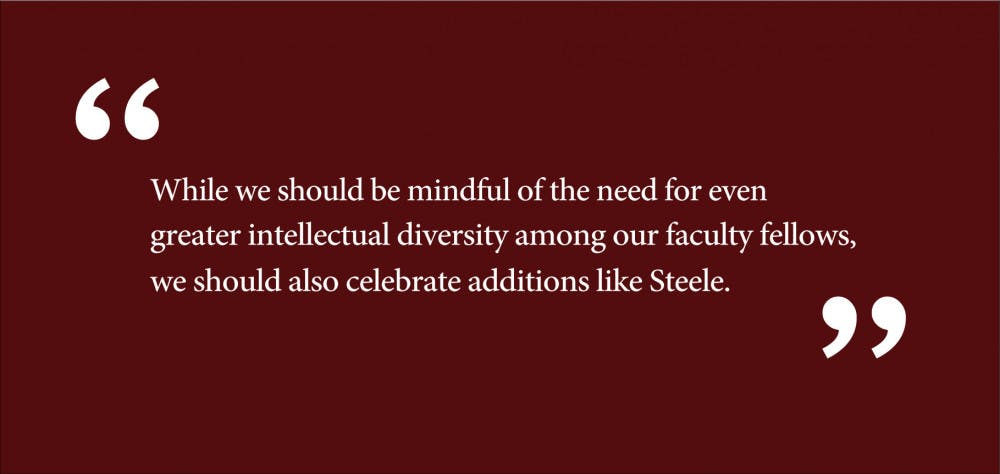Updated Sept. 20, 12:41 p.m.
In her Sept. 16 letter to The Herald, Julia Rock ’19 rightly noted that it would be reductive to treat the faculty fellowships of Democratic National Committee Chair Tom Perez ’83 P’18 and former Republican National Committee Chair Michael Steele as an adequate sampling of the full spectrum of U.S. politics, and she recognized that there exists a vibrant, and increasingly popular, discourse outside the bounds of what our traditional party system embraces. But Rock’s argument, in reducing the complexity of disagreements between the traditional U.S. parties in contemporary politics to essentially nothing, neglects the significance of the many substantive policy differences that separate Perez and Steele. In Rock’s estimation, disagreements over abortion, taxation, gun control and education, among many other issues, all seem to be unsubstantial, or at the very least, fuse together in a cloud of neoliberalism.
What’s more, Rock argues that right-wing politicians, by their nature, are frequently divisive, and so we should be wary of inviting them to serve in any capacity on our campus. While I have argued in the past, and continue to believe, that campuses have a responsibility to ensure they do not give a platform to speakers whose views pose a direct threat to the safety and dignity of its students, it is important to recognize the limitations of this argument. Steele might be wrong about most things, but by identifying him and his views as an example of unacceptable divisiveness, we minimize the gravity of truly dangerous speakers and thinkers and give extremist critics the evidence they need to show that their caricatures of political discourse on college campuses might not be so wrong after all.
To begin, we must recognize that Perez and Steele do, in fact, disagree quite sharply on a number of policies. Rock seems to overlook these by instead focusing on their similarities. But while no one will dispute that the two agree on many issues, that is insufficient to establish that the two don’t disagree over anything substantial. What one believes about free trade is largely independent of what one thinks about abortion. But it’s not surprising that Perez and Steele share many fundamental opinions about, say, the role of capitalism in American society or the merit of free trade, purely by virtue of the fact that they were politically socialized in the same mainstream society that prioritizes these things. But it is not convincing to dismiss the substantive policy differences between Perez and Steele by merely pointing out their similarities. If the only test we need to prove that two individuals do not meaningfully disagree with one another on major policy issues is pointing to substantial areas of agreement, we may conclude that Donald Trump and Bernie Sanders would not provide us with an acceptable diversity of opinions either on account of the fact that they both share certain fundamental opinions about capitalism or protectionism. Perez and Steele, then, still provide us with a reasonable — though by no means complete — diversity of opinions that we can engage with critically.
There is also danger in writing off most right-wing speakers as equally dangerous. Conflating Michael Steele with speakers like Milo Yiannopoulos (which Rock does implicitly suggest by referring generally to the divisiveness of “right-wing speakers” and “conservative figures”) for instance, is not only intellectually disingenuous, but also neglects the fact that dangerous views exist in various degrees. When we dismiss out of hand all right-wing views equally, we minimize, or at the very least, are less inclined to assess with nuance, the severity of the more extreme views. Rock’s argument, at least as it’s written, leaves no room for nuance in engaging with different views on the right.
While many of those arguing for greater conservative representation on college campuses are not debating in good faith — often, their goal is not actually to increase the diversity of political opinion on campus but to paint colleges as ideologically rigid and hostile toward those that don’t toe the supposed line — we merely fulfill the caricature that many on the right use as the basis for this argument in the first place. Rather than dying on this particular hill, our time is more productively spent resisting more offensive and dangerous speakers than Michael Steele.
While Rock is right that we should not content ourselves with Perez and Steele as the bookends of our political discourse, the real, substantive disagreements between them are highly relevant to contemporary political discourse. And while we should be mindful of the need for even greater intellectual diversity among our faculty fellows, we should also celebrate additions like Steele — who for better or worse, represents a significant strain of political thought in American society.
Connor Cardoso ’19 can be reached at connor_cardoso@brown.edu. Please send responses to this opinion to letters@browndailyherald.com and op-eds to opinions@browndailyherald.com.





